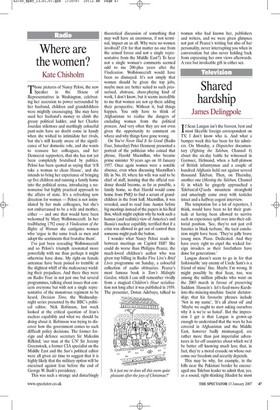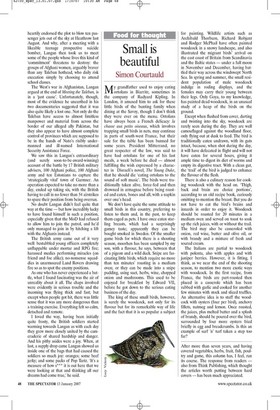Shared hardship
James Delingpole If Sean Langan isn't the bravest, best and most likeable foreign correspondent on TV, I don't know who is. And what a bumper week this has been for his admirers. On Monday, a Dispatches documentary (Fighting the Taleban, Channel 4) about the six-day battle he witnessed in Garmser, Helmand, when a half-platoon of British infantrymen and a couple of hundred Afghanis held out against several thousand Taleban. Then, on Thursday, another one (Meeting the Taleban, Channel 4) in which he gingerly approached a Taleban/al-Q'aeda mountain stronghold and amazingly came away with testicles intact and a halfway cogent interview.
The temptation for a lot of reporters, I think, would have been to let their gratitude at having been allowed to survive such an experience spill over into their editorial position. 'See, they're not just evil fanatics in black turbans,' the tacit conclusion might have been. 'They're jolly brave young men. Pious. Dedicated. And they have every right to expel the wicked foreign invaders as their forefathers have done for generations.'
Langan doesn't seem to go in for that fashionable 'any enemy of Uncle Sam's is a friend of mine' line. Maybe I'm wrong. It might possibly be that Sean, too, was among the million pillocks who went on the 2003 march in favour of preserving Saddam Hussein's let's-feed-more-Kurdsinto-the-mincing-machine fascist dictatorship; that his favourite phrases include 'Not in my name', 'It's all about oil' and 'Maybe we ought to start asking ourselves why it is we're so hated'. But the impression I get is that Langan is grown-up enough to understand that the wars he has covered in Afghanistan and the Middle East, however badly mismanaged, are rather more than just imperialist adventures in far-off countries about which we'd be better off knowing much less; that, in fact, they're a moral crusade on whose outcome our freedom and security depends.
This may be why, for example, in the hills near the Pakistani border he encouraged one Taleban leader to admit that, yes, as a sound, right-thinking Jihadist he most heartily endorsed the plot to blow ten passenger jets out of the sky at Heathrow last August. And why, after a meeting with a likeable teenage prospective suicide bomber, Langan then took us to meet some of the people whose lives this kind of 'commitment' threatens to destroy: the groups of Afghani women, arguably braver than any Taleban hothead, who daily risk execution simply by choosing to attend school classes.
The West's war in Afghanistan, Langan argued at the end of Meeting the Taleban, is in a 'just cause'. Unfortunately, though, most of the evidence he unearthed in his two documentaries suggested that it was also quite likely a lost one. Not only do the Taleban have access to almost limitless manpower and material from across the border of our alleged ally Pakistan, but they also appear to have almost complete control of provinces which are supposed to be in the hands of Nato's risibly undermanned and ill-named International Security Assistance Force.
We saw this in Langan's extraordinary (and surely soon-to-be-award-winning) account of the battle by 17 British military advisers, 100 Afghani police, 100 Afghani army and ten Estonians to capture the 'strategically vital' town of Garmser. An operation expected to take no more than a day, ended up taking six, with the British having to call in no fewer than 54 airstrikes to spare their position from being overrun.
No doubt Langan didn't feel quite that way at the time — but how incredibly lucky to have found himself in such a position, especially given that the MoD had refused to allow him to join the patrol, and he'd only managed to join in by hitching a lift with the Afghanis instead.
The British army came out of it very well: bestubbled young officers completely unflappable under mortar and RPG fire; harassed medics performing miracles (on friend and foe alike); no-nonsense squaddies in unarmoured Land Rovers drawing fire so as to spot the enemy positions.
As one who has never experienced a battle, what I found fascinating was the air of unreality about it all. The chaps involved were evidently in serious trouble and the incoming was flying thick and fast; but except when people got hit, there was little sense that it was any more dangerous than a training exercise. Everything felt so calm, detached and remote.
I loved the way, having been initially quite frosty, the British soldiers started warming towards Langan as with each day they grew more closely united by the cameraderie of shared hardship and danger. And his pithy asides were a joy. When, at last, a supply drop came Langan showed us inside one of the bags that had caused the soldiers so much joy: oranges; some beef jerky; and some packs of Pop Tartz. 'It's a measure of how s*** it is out here that we were looking at that and thinking all our dreams had come true,' he said.























































 Previous page
Previous page